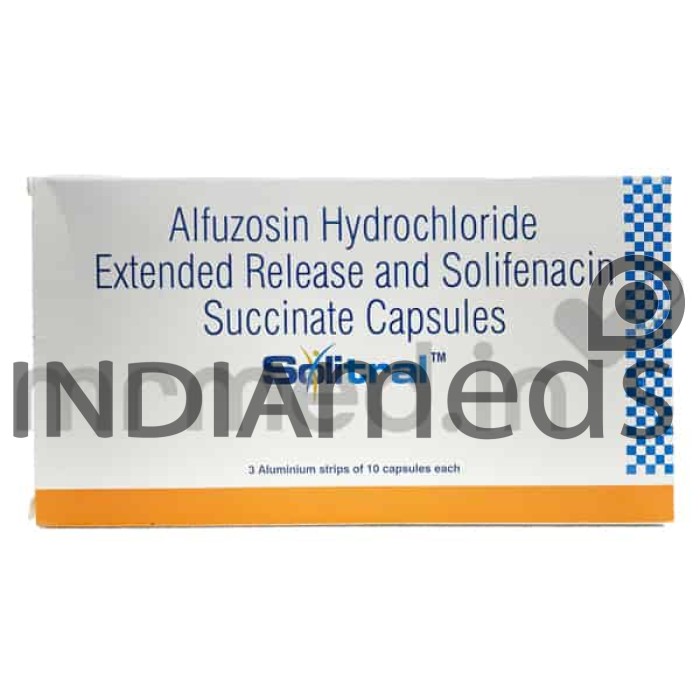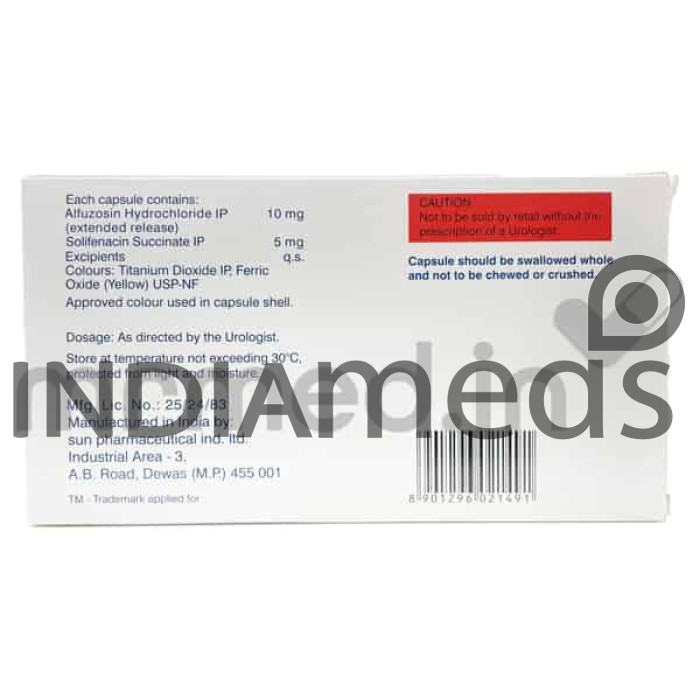Solitral capsule contains two active ingredients Alfuzosin and Solifenacin Succinate. This medicine is indicated for its use in treating Benign prostatic hyperplasia, a condition that causes prostate gland enlargement in men. The prostate gland is located under the urinary bladder; due to excess growth of the prostate gland, the urethra gets suppressed, leading to uncomfortable symptoms like difficulty in urination.
Do not take this medicine if you are allergic to Solitral capsule or its ingredients. Do not take this medicine if you have liver problems. It is advised that you inform your doctor if you are already taking medicines of the same class, such as their alpha-blockers such as Doxazosin, Indoramin, Prazosin, Terazosin, Tamsulosin, or Phenoxybenzamine to avoid serious complications. Also, if you are taking medication to treat high blood pressure, heart disorders, or fungal infections, report it to your doctor immediately. If you have kidney impairment, birth defects of heartbeat or heart failure, and low blood pressure, talk to your doctor before starting your treatment with this medicine.
If you are above 65 years old and have been prescribed this tablet, be careful while performing your regular activities, as this tablet might make you more sensitive to developing low blood pressure. While using Solitral capsule, you must notify your doctor about any planned surgical procedures to mitigate the risk of low blood pressure. This is a cancerous condition that commonly affects older men. While on your treatment with this tablet, it is highly unsafe to consume alcohol. Avoid handling machines or driving, as this tablet may cause dizziness and unusual tiredness.
Therapeutic Effects of Solitral Capsule
Pregnancy
Since Solitral capsule is not indicated for its use in women, there are no established studies for pregnant women.
Breast Feeding
Since Solitral capsule is not indicated for its use in women, there are no established studies for breastfeeding.
Lungs
It is unknown whether Solitral capsule is safe to be administered in patients with lung diseases. Inform your physician if you have any lung diseases before initiating the therapy.
Liver
Solitral capsule should not be in patients with impaired liver function. Contact your doctor for more information.
Alcohol
Avoid taking alcohol during Solitral capsule since it may cause low blood sugar. Consult your doctor for more information.
Driving
Avoid driving or doing activities that require focus since Solitral capsule may cause dizziness.
Serious
- Chest pain
- Allergic reaction- rashes, swelling, and trouble breathing
Common
- Dizziness
- Painful erection
- Headache
- Fatigue
- Stomach pain
- Dry mouth
- Visual disturbances
If you observe any side effects while taking Solitral capsule, stay hydrated by drinking plenty of fluids. Your medical professional may also recommend over-the-counter or prescription medications to help manage your symptoms. You should contact your physician if your side effects are severe or persistent.
There are no specific dietary restrictions associated with these medications. However, it is recommended to maintain a healthy and balanced diet to support overall health and well-being.
The time it takes for the Solitral capsule to start working varies from person to person. However, it is important to continue taking the medication as your healthcare provider prescribes to achieve optimal treatment outcomes.
Solitral capsule is usually taken orally, with food. It is important to follow the instructions provided by your healthcare provider or the medication's label for the most appropriate administration guidelines.
The common side effects of Solitral capsule are dizziness, painful erection, headache, fatigue, stomach pain, dry mouth, and visual disturbances.
Molecule name: Alfuzosin + Solifenacin Succinate | Therapeutic class: Alpha blocker |
Pharmacological class: 1.Alpha-adrenergic antagonist 2.Muscarinic receptor antagonists | Indications: Benign prostatic hyperplasia |






-200x200.jpg)